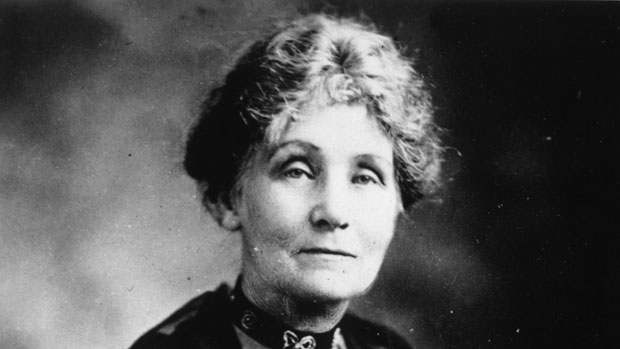Emmeline Pankhurst: the mother of British suffrage
Google doodle celebrates Emmeline Pankhurst – but why was she so controversial?

A free daily email with the biggest news stories of the day – and the best features from TheWeek.com
You are now subscribed
Your newsletter sign-up was successful
Today's Google doodle celebrates the birthday of Emmeline Pankhurst, British political activist, feminist, and leader of the suffragette movement who played a crucial role in winning the vote for women.
Who was Emmeline Pankhurst?
Emmeline Goulden was born to radical, feminist parents in Manchester in 1858 at a time when women could not vote and began attending women's suffrage meetings as a young child.
The Week
Escape your echo chamber. Get the facts behind the news, plus analysis from multiple perspectives.

Sign up for The Week's Free Newsletters
From our morning news briefing to a weekly Good News Newsletter, get the best of The Week delivered directly to your inbox.
From our morning news briefing to a weekly Good News Newsletter, get the best of The Week delivered directly to your inbox.
Emmeline attended the Ecole Normale de Neuilly in Paris and in 1878 married barrister Richard Pankhurst, an active supporter of the suffrage movement. They had three daughters, Sylvia, Christabel and Adela, who all grew up to work within the movement.
In 1889, Pankhurst founded the Women's Franchise League, which campaigned to allow married women to vote in local elections. She later formed the militant Women's Social and Political Union (WSPU) in 1903, which promised "deeds not words".
Why was she a controversial figure?
Pankhurst was criticised for the WSPU's militant tactics, which included destruction of property, assaulting police officers and even arson.
A free daily email with the biggest news stories of the day – and the best features from TheWeek.com
The press, public and politicians were shocked by such combative, revolutionary demonstrations by women. The tactics also caused division within the Pankhurst family, with Sylvia and Adela leaving the WSPU.
Like most suffragettes, Pankhurst and her daughters were arrested on numerous occasions and went on hunger strike while in prison, which resulted in "violent force-feeding" the BBC reports. Emily Davison, who was killed by the King's horse after she ran onto the track at the Epsom Derby in 1913, was a WSPU member.
Emmeline eventually called for an end to the group's aggressive tactics at the start of the First World War.
Pankhurst died in 1928, aged 69 and just two weeks before the government's Representation of the People Act (1928) extended the vote to all women over 21 years.
Why should we celebrating her?
Pankhurst is considered to be one of the most influential women in British history. After her death, the New York Herald Tribune called her "the most remarkable political and social agitator of the twentieth century and the supreme protagonist of the campaign for the electoral enfranchisement of women".
Some of Pankhurst's most famous quotes:
"Trust in God - she will provide."
"We are here, not because we are law-breakers; we are here in our efforts to become law-makers."
"The way to reform has always led through prison."
"The militancy of men, through all the centuries, has drenched the world with blood. The militancy of women has harmed no human life save the lives of those who fought the battle of righteousness."
-
 The Olympic timekeepers keeping the Games on track
The Olympic timekeepers keeping the Games on trackUnder the Radar Swiss watchmaking giant Omega has been at the finish line of every Olympic Games for nearly 100 years
-
 Will increasing tensions with Iran boil over into war?
Will increasing tensions with Iran boil over into war?Today’s Big Question President Donald Trump has recently been threatening the country
-
 Corruption: The spy sheikh and the president
Corruption: The spy sheikh and the presidentFeature Trump is at the center of another scandal